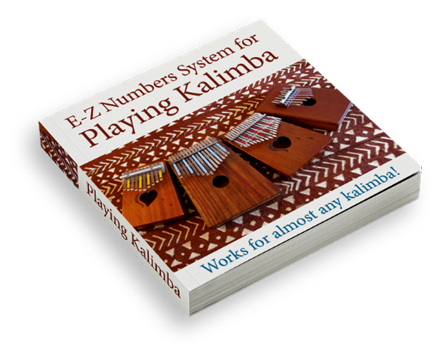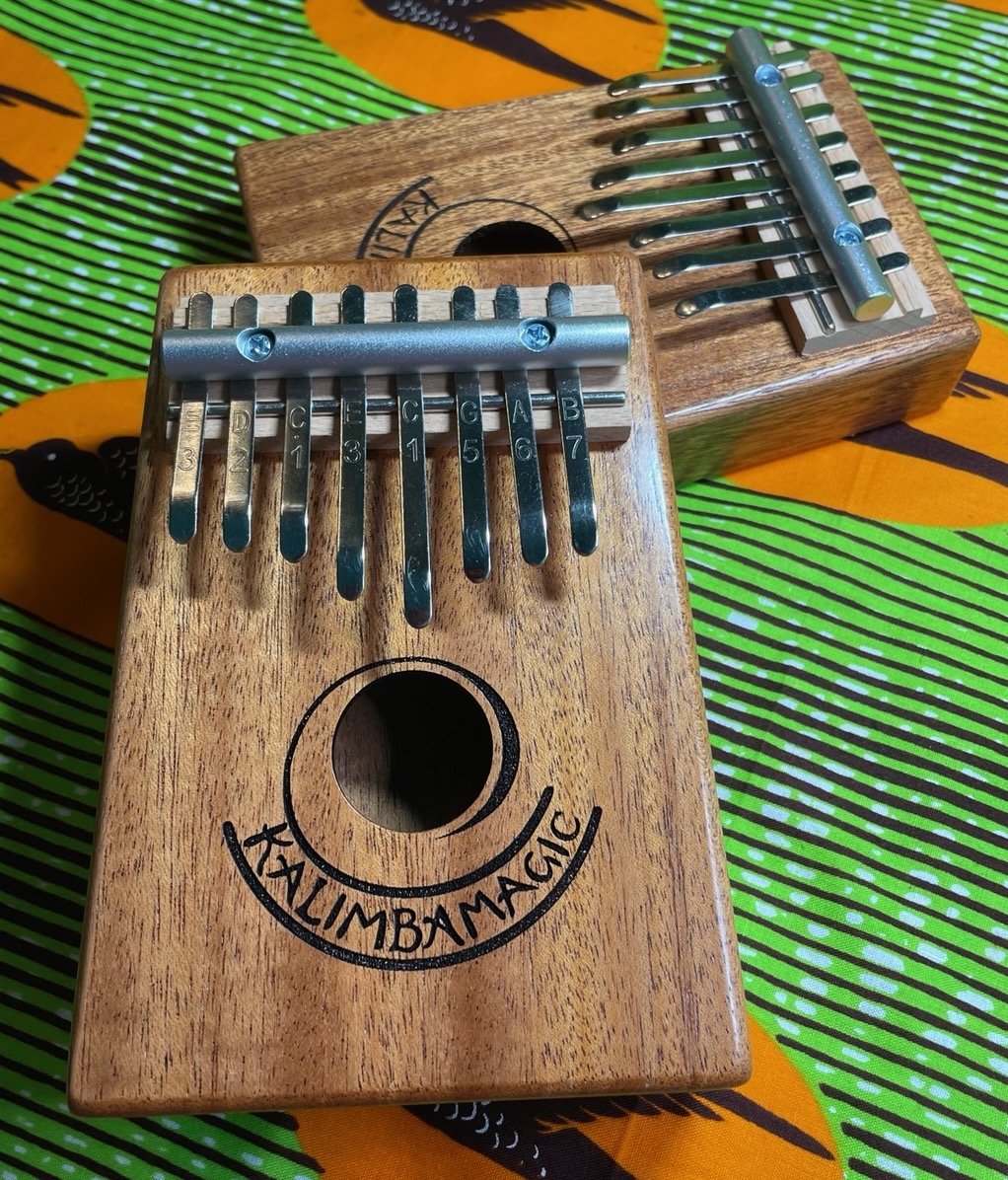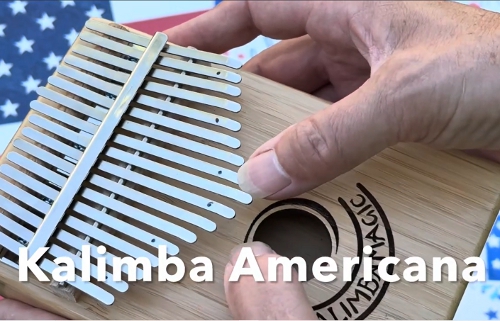Klara Wojtkowska is an accomplished musician and has contributed an array of interesting articles to Kalimba Magic. She has recently been abroad studying mbira and living in Zimbabwe.
“Forward Kwenda’s inspiration is deeply spiritual and in a way he sees his role as a musician who channels from a realm beyond our physical grasp. It has been said of Forward, ‘It is almost impossible to believe that one person, playing one time, could make so much music with two thumbs and one finger! Of course, Forward Kwenda, considered by many to be the greatest living mbira player today, says that his spirits play the mbira, not him.’”
Quote from https://music.williams.edu/events/visiting-artist-forward-kwenda-mbira
Forward Kwenda plays Tadzungaira
(The mbira is also known as mbira dzavadzimu, mbira nhare, and mbira huru)
Klara: What does “Tadzungaira” mean?
Forward: It means “we are suffering.”
Klara: Can you tell me a little about the song?
Forward: “Tadzungaira” was specially used for hard times. You know hard times – there are hard times that sometimes arise here in our country, like drought, serious severe drought – and they played this song in ceremonies. They want good results from the Ancestors. This is the song that people mostly prefer to play when they are wondering: How can we survive? How can we change for the better?
Klara: How did you come to mbira? How did you get started and how did you learn?
Forward: It’s a long story but I will try to tell you just briefly. In Zimbabwe there is South, East, West, North, and back then mbira music was mostly in the central parts of Zimbabwe, like here in Harare, Mashonaland, and Northern parts of Zimbabwe – those are the various places that mbira was popular. I wasn’t born in the central parts, I was born in Manicaland. Over there, my Ancestors played ngoma, drums – bakumba, shambara – which is very different from here. My father married my Mom. He was from Manicaland, she was from Mashonaland. My mom’s family was into mbira, from Mashonaland. So she came to the eastern part of Zimbabwe with my father – got me, and others. We are six. I am the last. At the age of eight a mbira master was hired in my family. He’s passed away now. He was a brilliant mbira player. His name was Murangiwa. That’s how I was caught. I was like, mmmm, I don’t think I have ever heard this type of music! So I asked my mom, what is this? She said, that’s mbira. I said, how come this is good music like this? She said – go for it.
My Mom was a spirit medium. She was a rainmaker spirit medium. Now, I started getting into mbira. On the main radio station of Zimbabwe, they played mbira every Tuesday and Thursday for thirty minutes. I wouldn’t want to miss those 30 minutes. Even if I was in class, I would hide somewhere near the radio so I could listen to those thirty minutes, and then go back to school. Finally my headmaster found out, but he was also a mbira lover. He found out I was dodging school to listen to mbira music, and so he said – “No, from today, don’t dodge, just go. I am also a mbira lover, so I understand what you feel.” I said, ‘Thank you sir!’ So each time there was music on the radio, I was going to listen. One day there was a man passing by close, very close to the school, where I was attending. He was holding a mbira. I said: ‘Sir, can you stop?’ He stopped. ‘Is that a mbira?’ ‘Yes, this is a mbira.’ ‘Oh, I love this thing!’ ‘Young man, no problem. See over there? That’s where I live. After school you can come see me and we will talk more.’ I thanked him and I went back to school. Soon after school I went to this guy’s house. That’s where I found a heap of mbiras of his. He said: ‘you can choose one for yourself. And I am not selling to you. You are too young, you can’t get any money anyway, so I am just giving this mbira to you, as a gift.’ You can imagine, I didn’t know what to say, I just cried. So I chose one mbira. After that, during those 30 minutes, I would learn mbira, not just listen, using that mbira that the man gave me. After school I would go to my room, lock the door, alone, no friends, no nothing – this was my friend now – and I would figure out which key was saying what. Of course, when you are young, your head is good at loading, so I could load lots of stuff and I wouldn’t forget. That’s how I started playing.
Klara: And then you started playing in ceremony?
Forward: Then, after one year of that I moved to Harare. I met several mbira players. Tute Chigamba… then I was even more excited, and we started playing together. They asked me – how did you learn? How did you learn? I said, that’s how it is, I learned by myself. So we played together. Then, one year later I was playing in a ceremony by myself. I tell you, it was very special. It was very spiritual. I liked it. I loved it. And they loved my music. And after one year of playing I changed all that music that was loaded into my head, new stuff was coming in. When I listened to this music, I would feel – I don’t think this music is ending here. I am not starting anything here, but my head, or my spirit, or my other two eyes were telling me – there is more. After learning all of the basic parts, and basic music and basic everything, I asked – can I do more? And I would do more. This was the biggest surprise to the people and the spirits in the ceremony – how come you are playing in a more ancient way? They called it that way, the more ancient way, the way I was playing. Because if I played Nhemamusasa – I would play the normal Nhemamusasa, and then I would go ahead, and they would say ‘wow.’ It was very special.
One time there was a man, Botho Nyamondera – he came to a ceremony, he heard about me. He was hiding and recording me during ceremony. Early in the morning he came to me, and he said, ‘Young man, come here. I want to record you. You are a special musician. I want you to be heard out there.’ I said, ‘Okay.’ He said, ‘Come to my place.’ And I went to his place and I started to record. My very first recording was Kariga Mombe, and the second was Nhemamusasa, and Shumba. And the third one was the one that has been making noise all over the world for a long time. That is the thing that made me known all over. So everybody was coming here from abroad in search of me because of that recording – it was a piece of Mahororo, but it was very nice, it became very popular. So because of that recording many people started coming in search of me, and that’s how I got into the different communities and the scene. That’s how it started.
Klara: There are a lot of sacred song traditions around the world. How would you describe the Shona sacred song tradition? What is the role of the songs? How are they remembered? What do they do?
Forward: You see, there is a different, special feeling with each song. Every single song has a meaning and a different feeling. So, remember, these songs have been played for decades and decades, like a Bible of songs. The stories in the Bible, they don’t change. These songs also don’t change. What changes is the people – the people who read the Bible or play the mbira. So the feeling also has to be the same. It’s important to practice the mbira and to practice the feeling to match and fit into the purposes, so it becomes purposeful for whatever you are doing. So for instance if you are playing “Taireva,” what is the meaning of “Taireva?” What is the meaning of “Tadzungaira?” What is the meaning of “Mahororo?” Why are you playing it? What time are you playing it? Why would you be playing that? So all of that stuff has to be put together according to what you want to do. There are different ceremonies – there are ceremonies for bringing rain in a drought, for bringing rain without drought, for thanksgiving, for people who just got married, we want to congratulate them. There are many different types of ceremonies. So you play songs according to that.
At first, in the setup of a ceremony, you don’t just play songs that are purposeful in that ceremony, but there is the particular time. That’s when you play the most songs that are supposed to honor that ceremony. That’s all that it is.
Klara: If you play the songs outside of ceremony, should you also play them with intention?
Forward: If you play outside the ceremonies, there is also a feeling each time that you play each song. So if you are outside the ceremony there is also a feeling. It is never the same. It is always different. When you are in ceremony there is a lot happening. Spirits are there, you must honor, you must pay respects. When you play outside of Ceremony you have a different feeling, a different attitude.
Klara: So why are ceremonies in Zimbabwe getting less popular?
Forward: Less popular? I’m not sure about that. I’m not sure what to say about that. As far as I know, ceremonies are always there. They are always very popular, but you know… this is city, this is town. But even in cities I know ceremonies are happening every weekend and in the rural areas the ceremonies are happening. It’s just maybe they are… you know like there is church, there is Christianity around town, around Harare. They announce it very well in the radios. So it’s just different. They don’t announce ceremonies, they just call each other and just do them. I think it’s maybe equal, but they have no announcements (for ceremonies). Christianity is all over, so it seems that it has taken over, but really it has not. It will never.
Klara: Why?
Forward: Because I know that traditional tradition, the culture is never going to be overtaken by the Bible. Nothing else has ever taken over the culture. Even from where you come from you have your culture. It has never been run over.
Klara: You have a lot of faith.
Forward: As long as people are there, as long as people are living, I know, I understand that – my understanding is that – people will always every day have different feelings, different views, different motivations and different understandings. So nothing can run over anything. You can never run over Christianity, and Christianity can never run over the tradition. They can never come together like that.
Klara: I like your faith. Everyone else is being very despondent. The Earth is being destroyed, nobody is talking to the trees anymore…
Forward: It’s still happening man, everything is still the same. I have experienced a lot of stuff in my life, and today. Things that have been happening long back that are still happening right now, and how can I think that they will at some point vanish? I am allowed to think like that, but it will never happen, it’s not true. The Truth is always there.
Klara: Yes, that’s very true.
Forward: There can never be anything else other than Truth.
Klara: Do you play the nyunga nyunga at all?
Forward: Yes. I play nyunga nyunga, I play njari, I play mavembe, I play ngoma drums, I sing and dance.
Klara: Most people in the city play the nyunga nyunga, and not the nhari.
Forward: Some people cannot learn nhare. It’s too complicated for them. Nyunga nyunga has fewer keys and it’s easier. And secondly, they are coming from schools – nhare has never been in schools. The mbiras are just coming to schools now, because of the Mbira Centre. So, before that there was just nyunga nyunga in schools. So many younger generations are coming from schools with their nyunga nyungas. According to my knowledge, nyunga nyunga comes from Mozambique. It’s a Mozambican mbira, not Zimbabwean. But somehow they were the first to introduce it to young school attendees, and now it is very popular. That doesn’t mean the nhare is not popular. They are the same according to their popularity.
This nhare is now in India, in Japan, in Peru, in France, Britain – this nhare is now all over the world. United States, Canada, Alaska, Australia. I have students all over the world. Where do you want to go?
Klara: Poland!
Forward: Yes, Poland! I have students in Poland. The only place I don’t have students is Paraguay. But Uruguay, New Zealand… Russia, the mbiras are all over the place in Russia. It’s all over.
Klara: So why is the nhare so popular all over the world?
Forward: That’s the hardest question. One, there was a prophecy, a prophet of Zimbabwe called Chaminuka. He prophesied about this nhare before he passed away. He said this nhare will be played all over the world, because we are ONE. The whole world is ONE, from ONE Ancestor. It’s way beyond some other people’s research, but that was his prophecy, come to pass.
Klara: But people around the world don’t hold bira ceremonies, right?
Forward: Yes, they do! But they have ceremonies according to their cultures, accompanied with nhare mbira. And their spirits come, and they are happy with their music. I went to Japan and I played. They told me they don’t know about spirits – they have their own way of doing their culture, and it’s very different from us, very different from many cultures. When I played mbira, when I played nhare, at first I was getting very little response from them. But within less than a month I was getting full theatres and stuff, filled with people. They all told me that they somehow felt something – now they were asking, what is this mbira that you are doing, and they started to follow what I say, and understand more, and they attached that to the music, and they found themselves entranced, and they started to see their spirits. And I told them – you have your spirits, whether you see them or not, they are there. And my work would be to get you together with your Ancestors, so let’s go. And at the very last they said, don’t go! Please stay! And I said, I have to go now. Now you see you have your spirits, and they were crying. Everything is even, according to my experimentation and experience. I think everything is even in this planet, and everything is still existing. We just need to see it.
Klara: So you would say it’s a trance instrument?
Forward: Yes. It puts me into trance. So maybe, the way I play too, it puts people into trance.
Klara: The way you play is very beautiful. Thank you for playing, and for this interview.
Forward: Thank you.


Sign up for our newsletter and free resources with your email address:
We pinky promise not to spam you and to only send good stuff.
 Christmas in July 2025
Christmas in July 2025 Patriotic and American Music for Kalimba
Patriotic and American Music for Kalimba